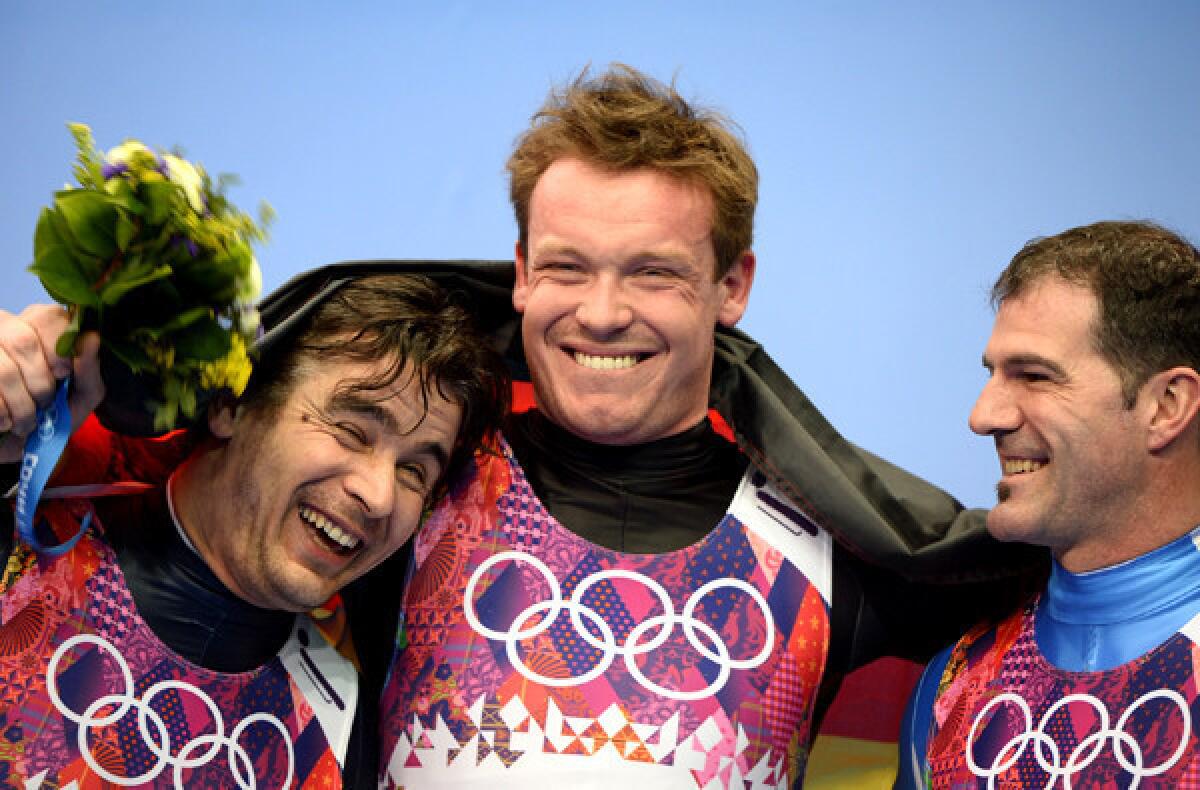Germany’s Felix Loch is winning luger — get used to it

- Share via
SOCHI, Russia — The future of luge racing belongs to Germany’s Felix Loch, who successfully defended his Olympic title and will probably bid farewell to his two biggest rivals later this week.
Loch executed two perfect runs Sunday to beat Albert Demchenko of Russia by .48 of a second and Italy’s Armin Zoeggeler by 1.27 seconds over four weekend runs at the Sanki Sliding Center. At the end of the two-day competition, the normally reserved Loch jumped off his sled and slid down the deceleration zone in his track shoes.
Demchenko and Zoeggeler are expected to retire after the Olympics, creating room for movement in the sport’s typically static world rankings. That should offer some breathing room to the 24-year-old Loch, who acknowledged the pressure he felt competing against the two veteran sliders.
“It was very difficult, in Russian territory, against Russia and against Armin,” Loch said. “I’m so relieved now.”
Demchenko became the oldest medalist in an individual event at the Winter Games at 42 years 74 days. He earned his first Olympic medal, also a silver, in 2006 in Turin.
“I’m glad that I got the silver medal,” he said. “All medals, no matter any medals, at Olympics are special.”
Zoeggeler’s bronze made him the sport’s most-decorated Olympic athlete. His medal — his sixth in a career that includes gold in Turin and Salt Lake City – also makes him the first athlete in any sport to win medals at six Winter Olympics.
The 40-year-old Italian appeared visibly moved by the crowd’s loud adoration after his final run. He attempted to explain his emotions at a post-race news conference, but his voice faltered and he said he would try to find the words to describe them by week’s end.
He later walked through the sliding center’s media area, signing autographs and posing for pictures with European journalists who have covered his storied career.
“This is good for me, good for the sport, good for Italy,” he said. “It’s very nice, I’m happy with this medal. I have had a good time.”
Demchenko stopped short of announcing his retirement after the race but hinted that he wouldn’t be competing at the 2018 Games in Pyeongchang, South Korea.
“I might be at the next Olympics as coach,” he said.
The Sochi podium — occupied by three men who had all medaled previously — reflects the importance of both experience and a strong federation in the world of luge. Given Loch’s age, his competitors believe he is at the beginning of a long, powerful one-man luge dynasty.
“Absolutely. Felix is young and he’s got a great program behind him,” U.S. luger Chris Mazdzer said. “You’re really not only facing Felix, you’re facing a dominant German organization which has produced some excellent athletes and some great coaches at the same time.”
Mazdzer posted the U.S. team’s best performance in the event, finishing 13th. He finished in the same spot at the Vancouver Games four years ago.
U.S. sliders Tucker West and Aidan Kelly finished 22nd and 24th, respectively.
Loch, Demchenko, Zoeggeler and Mazdzer will have another chance at a medal Thursday when they compete in the team relay.
Twitter: @stacystclair
More to Read
Go beyond the scoreboard
Get the latest on L.A.'s teams in the daily Sports Report newsletter.
You may occasionally receive promotional content from the Los Angeles Times.





